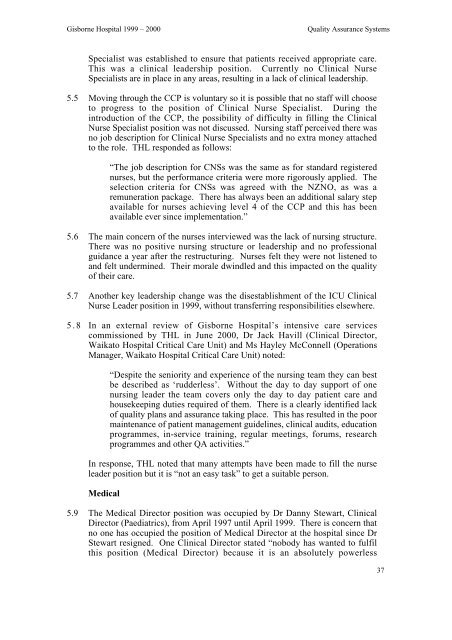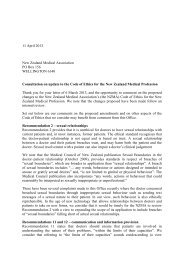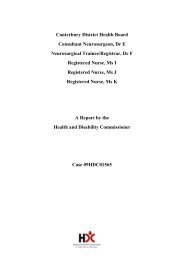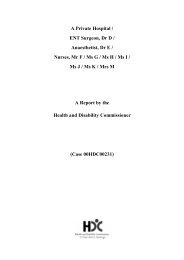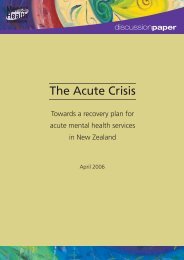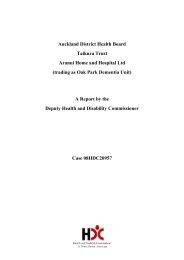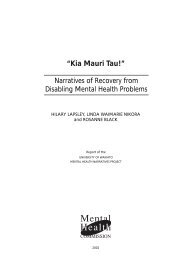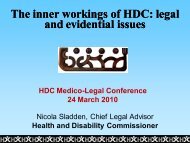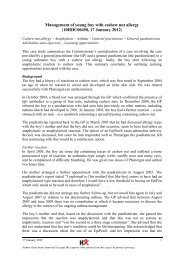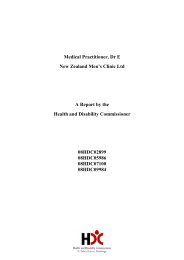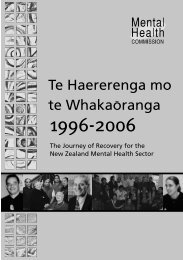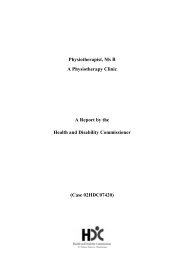Gisborne Hospital Report - Health and Disability Commissioner
Gisborne Hospital Report - Health and Disability Commissioner
Gisborne Hospital Report - Health and Disability Commissioner
You also want an ePaper? Increase the reach of your titles
YUMPU automatically turns print PDFs into web optimized ePapers that Google loves.
<strong>Gisborne</strong> <strong>Hospital</strong> 1999 – 2000<br />
Quality Assurance Systems<br />
Specialist was established to ensure that patients received appropriate care.<br />
This was a clinical leadership position. Currently no Clinical Nurse<br />
Specialists are in place in any areas, resulting in a lack of clinical leadership.<br />
5.5 Moving through the CCP is voluntary so it is possible that no staff will choose<br />
to progress to the position of Clinical Nurse Specialist. During the<br />
introduction of the CCP, the possibility of difficulty in filling the Clinical<br />
Nurse Specialist position was not discussed. Nursing staff perceived there was<br />
no job description for Clinical Nurse Specialists <strong>and</strong> no extra money attached<br />
to the role. THL responded as follows:<br />
“The job description for CNSs was the same as for st<strong>and</strong>ard registered<br />
nurses, but the performance criteria were more rigorously applied. The<br />
selection criteria for CNSs was agreed with the NZNO, as was a<br />
remuneration package. There has always been an additional salary step<br />
available for nurses achieving level 4 of the CCP <strong>and</strong> this has been<br />
available ever since implementation.”<br />
5.6 The main concern of the nurses interviewed was the lack of nursing structure.<br />
There was no positive nursing structure or leadership <strong>and</strong> no professional<br />
guidance a year after the restructuring. Nurses felt they were not listened to<br />
<strong>and</strong> felt undermined. Their morale dwindled <strong>and</strong> this impacted on the quality<br />
of their care.<br />
5.7 Another key leadership change was the disestablishment of the ICU Clinical<br />
Nurse Leader position in 1999, without transferring responsibilities elsewhere.<br />
5.8 In an external review of <strong>Gisborne</strong> <strong>Hospital</strong>’s intensive care services<br />
commissioned by THL in June 2000, Dr Jack Havill (Clinical Director,<br />
Waikato <strong>Hospital</strong> Critical Care Unit) <strong>and</strong> Ms Hayley McConnell (Operations<br />
Manager, Waikato <strong>Hospital</strong> Critical Care Unit) noted:<br />
“Despite the seniority <strong>and</strong> experience of the nursing team they can best<br />
be described as ‘rudderless’. Without the day to day support of one<br />
nursing leader the team covers only the day to day patient care <strong>and</strong><br />
housekeeping duties required of them. There is a clearly identified lack<br />
of quality plans <strong>and</strong> assurance taking place. This has resulted in the poor<br />
maintenance of patient management guidelines, clinical audits, education<br />
programmes, in-service training, regular meetings, forums, research<br />
programmes <strong>and</strong> other QA activities.”<br />
In response, THL noted that many attempts have been made to fill the nurse<br />
leader position but it is “not an easy task” to get a suitable person.<br />
Medical<br />
5.9 The Medical Director position was occupied by Dr Danny Stewart, Clinical<br />
Director (Paediatrics), from April 1997 until April 1999. There is concern that<br />
no one has occupied the position of Medical Director at the hospital since Dr<br />
Stewart resigned. One Clinical Director stated “nobody has wanted to fulfil<br />
this position (Medical Director) because it is an absolutely powerless<br />
37


